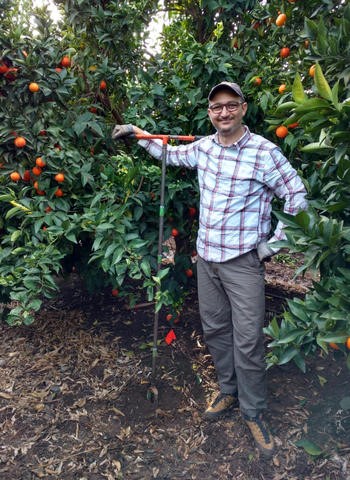The University of California, Riverside won a $10 million grant to develop artificial intelligence that will increase the environmental and economic stability of agriculture in the Western U.S. and train future researchers.
This Sustainable Agricultural Systems grant is one of nine given by the USDA’s National Institute of Food and Agriculture, or NIFA, annually to shape the future of U.S. agriculture. It is the third-largest grant in UCR history, according to the university.
This project will focus on the Colorado River Basin and Salinas River Valley areas, which employ more than 500,000 people and generate roughly $12 billion annually in revenue.
Over the last 20 years, the region has experienced major, prolonged droughts over the past 20 years, and is increasingly under attack by weed, pathogen, and insect invasions worsened by climate change. In addition to insufficient water, soil and water degradation from excessive salt and chemicals is also a threat. This project, which is planned to start in September, will develop solutions to these problems in the form of new data science tools, a new multistate cooperative extension program for growers, and a fellowship to educate future agriculture leaders, the UCR noted in a release.
One of the major challenges of this project will be teaching AI algorithms to synthesize massive amounts of data from a wide variety of sources. Vagelis Papalexakis, assistant professor of computer science and engineering, explained there is currently no one prevailing method for combining such radically different types of data.
The crux of the solution, he said, will involve inventing new statistical and algebraic models that find repeated and generalizable patterns between seemingly different types of data.
“This will be an endeavor that will help make field management more efficient, reduce costs for growers, and make food more accessible,” Papalexakis said. “This by itself is an amazing prospect. But the lessons learned from this project also have the potential to advance core AI techniques for combining large, disparate data sets, which extend to a wide variety of real-life applications.”
Elia Scudiero, a professional researcher in UCR’s Department of Environmental Sciences, is the project’s principal investigator. In addition to Scudiero, the following UC Riverside scientists are involved: Hoori Ajami, Ahmed Eldawy, Milt McGiffen, Connie Nugent, Vagelis Papalexakis, Alexander Putman, Monique Rivera, and Kurt Schwabe. Partner institutions include UC Agriculture and Natural Resources, USDA Agricultural Research Service, University of Arizona, Duke University, Colorado State University, and University of Georgia.
Interested in more coverage and insights? Receive a free month of Agri-Pulse or Agri-Pulse West by clicking here.

Digital Agriculture Team Principal Investigator Elia Scudiero. (Elia Scudiero/UCR)
Funds from this grant will establish a Digital Agriculture Fellowship program that will recruit more than 50 students over the next five years. Data, environmental, or agricultural science students will mostly come from UCR, while some will come from partnering institutions. Those coming from other universities will spend summers at UCR participating in career development activities. Students will be paired with faculty mentors to develop unique research projects they’ll undertake throughout their 1.5 years as fellows. Internships with key commercial partners are also a focal feature of the program.
“This work is very relevant not only for California, but for the entire U.S. Southwest because of water scarcity and other environmental challenges facing us all,” Scudiero said in the release. “We hope to bring transformative changes to the entire farming system in this area of the country and engage students, as well as the research and farming communities in the process.”
For more news, go to: www.Agri-Pulse.com


